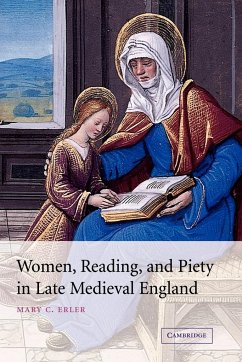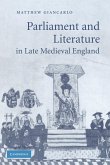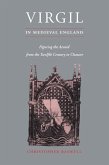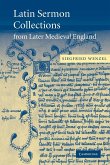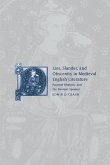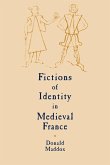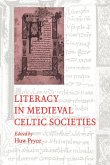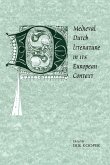Narratives of medieval women offer new insights into networks of female book ownership and exchange.
Women, Reading, and Piety in Late Medieval England traces networks of female book ownership and exchange which have so far been obscure, and shows how women were responsible for both owning and circulating devotional books. In seven narratives of individual women who lived between 1350 and 1550, Mary Erler illustrates the ways in which women read and the routes by which they passed books from hand to hand. These stories are prefaced by an overview of nuns' reading and their surviving books, and are followed by a survey of women who owned the first printed books in England. An appendix lists a number of books not previously attributed to religious women's ownership. Erler's narratives also provide studies of female friendship, since they situate women's reading in a network of family and social connections. The book uses bibliography to explore social and intellectual history.
Review quote:
'Mary Erler's discussion offers both new information and new ways of thinking about it.' The Ricardian
'- excellent and ground-breaking case studies offered in each chapter - the evidence that this book yields is going to be essential to a better understanding of reading practices in the late-medieval period - The author should be praised for delivering such a wealth of information -'. Medium Aevum
'- elegant and useful - Women, Reading, and Piety in Late Medieval England was a pleasure to read and ought to be on every medieval English scholar's bookshelf.' Canadian Journal of History
'Women, Reading, and Piety is an interesting and compelling study - Erler has succeeded with this work, and provided her readers with a considered, highly detailed, frequently provocative, and undeniably important contribution to women's literary and social history.' Jacqueline Jenkins, University of Calgary
'- not only sets forth a compelling argument about the place of reading in medieval women's lives, but also opens up promising venues for future research - a pleasure to read - Erler's book provides persuasive answers to many questions surrounding women's reading practices.' Moira Fitzgibbons, Marist College
'- rich and well-documented -'. Sharp News
'- Erler's approach has much to offer the researcher interested in religion, spirituality, and indeed 'piety in late medieval England - Women, Reading, and Piety in Late Medieval England will be of as much interest to religious historians as it is to historians of the book. It is a thoughtful and reflective contribution to the history of female reading -'. The Library
'Mary Erler's Women, Reading, and Piety in Late Medieval England offers a truly groundbreaking contribution to medieval studies.' Studies in the Age of Chaucer
'This is an admirable book. It is well researched, well written, and well presented, and it represents a real advance in the ongoing re-evaluation of women's reading and literacy in late medieval England. - a fine piece of solid scholarship. It suggests a number of important avenues for further research, and it is a major contribution to the ongoing reassessment of the literary and intellectual culture of medieval religious women.' Journal of English and Germanic Philosophy
Table of contents:
Acknowledgments; Prologue; Introduction: Dinah's story; 1. Ownership and transmission of books: women's religious communities; 2. The library of a London vowess: Margery de Nerford; 3. A Norwich widow and her devout society: Margaret Purdans; 4. Orthodoxy: the Fettyplace sisters at Syon; 5. Heterodoxy: anchoress Katherine Manne and abbess Elizabeth Throckmorton; 6. Women owners or religious incunabula: the physical evidence; Epilogue; Appendices; Notes; Select bibliography; Indexes.
Hinweis: Dieser Artikel kann nur an eine deutsche Lieferadresse ausgeliefert werden.
Women, Reading, and Piety in Late Medieval England traces networks of female book ownership and exchange which have so far been obscure, and shows how women were responsible for both owning and circulating devotional books. In seven narratives of individual women who lived between 1350 and 1550, Mary Erler illustrates the ways in which women read and the routes by which they passed books from hand to hand. These stories are prefaced by an overview of nuns' reading and their surviving books, and are followed by a survey of women who owned the first printed books in England. An appendix lists a number of books not previously attributed to religious women's ownership. Erler's narratives also provide studies of female friendship, since they situate women's reading in a network of family and social connections. The book uses bibliography to explore social and intellectual history.
Review quote:
'Mary Erler's discussion offers both new information and new ways of thinking about it.' The Ricardian
'- excellent and ground-breaking case studies offered in each chapter - the evidence that this book yields is going to be essential to a better understanding of reading practices in the late-medieval period - The author should be praised for delivering such a wealth of information -'. Medium Aevum
'- elegant and useful - Women, Reading, and Piety in Late Medieval England was a pleasure to read and ought to be on every medieval English scholar's bookshelf.' Canadian Journal of History
'Women, Reading, and Piety is an interesting and compelling study - Erler has succeeded with this work, and provided her readers with a considered, highly detailed, frequently provocative, and undeniably important contribution to women's literary and social history.' Jacqueline Jenkins, University of Calgary
'- not only sets forth a compelling argument about the place of reading in medieval women's lives, but also opens up promising venues for future research - a pleasure to read - Erler's book provides persuasive answers to many questions surrounding women's reading practices.' Moira Fitzgibbons, Marist College
'- rich and well-documented -'. Sharp News
'- Erler's approach has much to offer the researcher interested in religion, spirituality, and indeed 'piety in late medieval England - Women, Reading, and Piety in Late Medieval England will be of as much interest to religious historians as it is to historians of the book. It is a thoughtful and reflective contribution to the history of female reading -'. The Library
'Mary Erler's Women, Reading, and Piety in Late Medieval England offers a truly groundbreaking contribution to medieval studies.' Studies in the Age of Chaucer
'This is an admirable book. It is well researched, well written, and well presented, and it represents a real advance in the ongoing re-evaluation of women's reading and literacy in late medieval England. - a fine piece of solid scholarship. It suggests a number of important avenues for further research, and it is a major contribution to the ongoing reassessment of the literary and intellectual culture of medieval religious women.' Journal of English and Germanic Philosophy
Table of contents:
Acknowledgments; Prologue; Introduction: Dinah's story; 1. Ownership and transmission of books: women's religious communities; 2. The library of a London vowess: Margery de Nerford; 3. A Norwich widow and her devout society: Margaret Purdans; 4. Orthodoxy: the Fettyplace sisters at Syon; 5. Heterodoxy: anchoress Katherine Manne and abbess Elizabeth Throckmorton; 6. Women owners or religious incunabula: the physical evidence; Epilogue; Appendices; Notes; Select bibliography; Indexes.
Hinweis: Dieser Artikel kann nur an eine deutsche Lieferadresse ausgeliefert werden.

